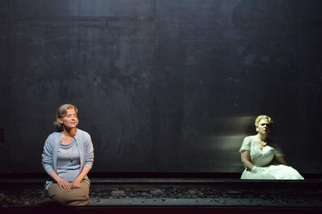|
Back
An Alpha Experience Miami
Adrienne Arsht Center for the Performing Arts
04/02/2016 - & April 3*, 5, 8, 9, 2016
Mieczyslaw Weinberg: The Passenger, opus 97
David Danholt (Walter), Daveda Karnaras (Liese), Tony Dillon (Steward, Elderly Passenger), Geraldine Dulex (Kapo/Overseer), Alex Soare (First S.S. Officer), Zachary Elmassian (Second S.S. Officer), Daniel Bates (Third S.S. Officer), Adrienn Miksch (Marta), Robynne Redmon (Old Woman), Elena Galván (Ivette), Hilary Ginther (Vlasta), Eliza Bonet (Krystyna), Kathryn Day (Bronka), Agnieszka Rehlis (Hannah), Anna Gorbachyova (Katya), John Moore (Tadeusz)
Florida Grand Opera Chorus, Katherine Kozak (chorus master), Florida Grand Opera Orchestra, Steven Mercurio (conductor)
David Pountney (director), Johan Engels (scenic design), Marie-Jeanne Lecca (costume design), Fabrice Kebour (lighting design)

A. Miksch, D. Karnaras (© Brittany Mazzurco-Muscato)
When this opera finally premiered, there was a significant amount of hoopla. Its composer had died more than a decade earlier and though the world had perhaps moved away from works concerning Europe’s Holocaust, it never really can, especially when we continue seeing events not unlike it, happening every day.
I know I was not alone in being suspicious of this opera’s music. I heard it on the broadcast from Lyric Opera of Chicago last season and while it was not unpleasant, it seemed like something that would not linger long on the ear. Listening without a translated libretto, I found it all rather confusing.
Once one sees The Passenger, however, its clarity becomes one of its greatest assets. There is no doubt how the librettist, Alexander Medvedev, morally regards its themes. We may watch the main protagonist, Liese, confront her past and notice her struggle to rediscover some dignity, but in the end, we dislike her all the more as she is unwilling to accept her culpability. On top of that she struggles to understand how prisoners could have ever hated her after all she had done for them.
At the conclusion of the first act it is also evident that the music is very beautiful. Of course not like a lyrical Italian or German opera of the 19th century, how could it be with such subject matter; nevertheless it is always stimulating, engrossing, and ultimately intensely moving. The opening power of the timpani lets us know that this experience is going to be one, the likes of which, we have never known.
Like a good drama, the first act is mainly exposition as it introduces us to a strong but simple plot which soon gives way to exploring rich depths. Those worried we will be forced to bask in human depravity will be pleasantly relieved that the goal of this opera is quite different. The result is not to understand why its characters have demonstrated such behavior; it is accepting it and making one conscious so that it is not repeated. In the second act the music takes on lyricism as we come to better identify with the prisoners’ plight and more importantly the bonds that maintain their survival.
An opera like The Passenger survives solely as a collaborative effort. The physical production is instrumental. False steps will destroy the essence. Authenticity is the aim and with the thorough design of sets (Johan Engles), costumes (Marie-Jeanne Lecca) and lighting (Fabrice Kebour) it is hard to imagine the opera with any other; the physical artistry is integral to the piece.
This is similar with the outstanding cast. How can a piece like this not be abounding with potential diva moments for the leads Daveda Karnaras (Liese) and Adrienn Miksch (Marta). But committed artists, they are simply fundamental to its success. Applauding the cast at the end was not an easy task. If anyone stood out, he or she would have made a grave error. Clearly the brilliant director David Pountney understands this work and the limits he must make to secure its power. Likewise the magnetic conducting of Steven Mercurio which brings out the richness of the orchestration yet never interferes with the singers’ interpretations.
Yes, the opera is frightening. Yes it is beautiful and no, it is never sentimental though there are moments in the camp when tenderness breaks through. And underneath it all there is the ungratifying fact that Liese is being honest when she praises herself for being a good German, yet was unwilling to be an active participant in the atrocities. These statements sit very uncomfortably with us; who can honestly say he or she wouldn’t have behaved similarly under such circumstances. To really experience this opera, your own values must be constantly challenged.
I am sure that most audience members feel that to experience this opera just once cannot do it justice. It is not unlike seeing an epic movie where each viewing will give further insight. Though it seems unlikely that The Passenger will become part of the standard repertory, it is a work that will always be regarded as a landmark in observing history’s most savage era.
Jeff Haller
|